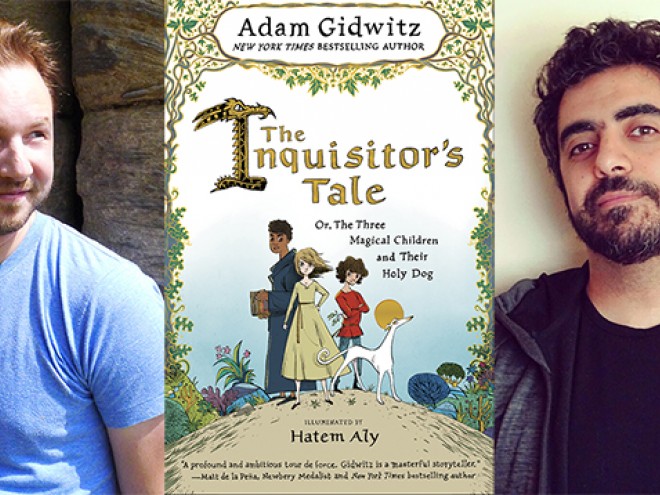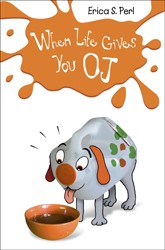Max Bretzfeld is eleven years old and about to face the most significant challenges of his young life. His parents have made the decision to send him to England on the kindertransport program, because life in 1930s Berlin has become unbearable for Jews. Arriving at his supposed haven, Max discovers that his host family, also Jewish, are so culturally different from his own family that he will need to reset all his expectations about his heritage. He’ll also become intimately acquainted with British antisemitism — seemingly more genteel and less threatening than the German variety. Fortunately, Max has “two immortal creatures” from Jewish folklore stationed on his shoulders. Adam Gidwitz’s new novel circumvents all clichés about identity and crafts a thrilling story about espionage.
Stein and Berg are supernatural beings who argue incessantly over how to help Max, their differing perspectives acted out as a comedic tug-of-war about the boy’s dilemma. Stein is the well-known dybbuk, a disembodied spirit intent on annoying his chosen host. Berg is the less familiar kobold, a small goblin also known for mischief. Their current mission, however, is more consequential. Max, like all of the kindertransport participants, is devastated by his separation from his parents and determined to be reunited with them. His ability to construct radios, which will be an essential part of the war effort, allows him to stay on top of international events. When his emotional motivation converges with his intellectual and mechanical skills, an opportunity presents itself — but it will involve espionage. Gidwitz turns an improbable premise into a believable series of events with an ambiguous outcome, to be continued in a sequel.
Living with the wealthy and assimilated Montagu family, Max needs to recalibrate his beliefs about how Jews fit into the larger society. The colorful cast of characters includes the patriarch, Mr. Montague; Uncle Ivor, a naively committed Communist; and the more conformist Uncle Ewen, whose Jewish identity is quietly asserted alongside his British one. The two boys, David and Anthony, attend the elite school in which Max also enrolls, and where he learns that disdain, if not outright hatred, for Jews is the norm. If the English language is barely comprehensible to Max, then the dialect specific to upper-class students and their haughty teachers adds another layer of confusion. Gidwitz playfully challenges his readers with baffling terminology: “There is no ragging in yard, even during a tie, and any ragging will result in a very good tan.… Max, you being the lowest form of life in the second form, you shall be sport come tea.” Wry humor aside, this exchange on the playing field raises the issue of divisive class differences, even as all of Britain is about to confront a common enemy.
Max’s beloved father is a watchmaker, and, ultimately, the lessons Max learned from him about fitting delicate pieces together in a careful process will be applied to his new role as a spy. Every obstacle seems destined to defeat Max, but each one is transformed into a test that he can pass.
The question of what it means to be a Jew in the eyes of non-Jews is not easily resolved. Lord Rothschild, one of several historical figures in the novel, describes the paradox of his life as a powerful leader: “Because while we can hop back and forth between our two identities — we can also be pushed.… So what is a Jew? The tip of the top? Or beneath the heel of the boot?” Adam Gidwitz brings all his gifts as a writer to this perennial question.
Emily Schneider writes about literature, feminism, and culture for Tablet, The Forward, The Horn Book, and other publications, and writes about children’s books on her blog. She has a Ph.D. in Romance Languages and Literatures.





